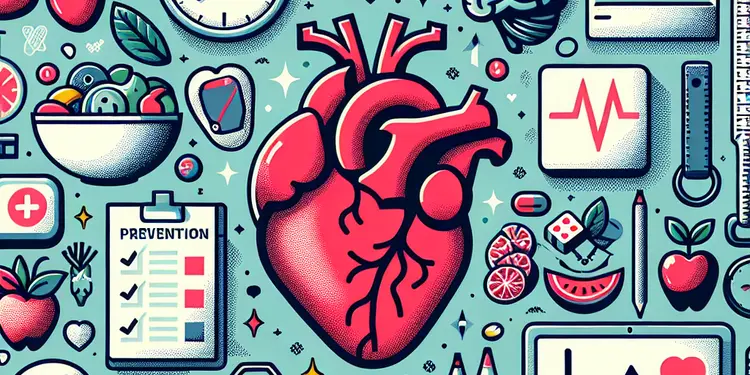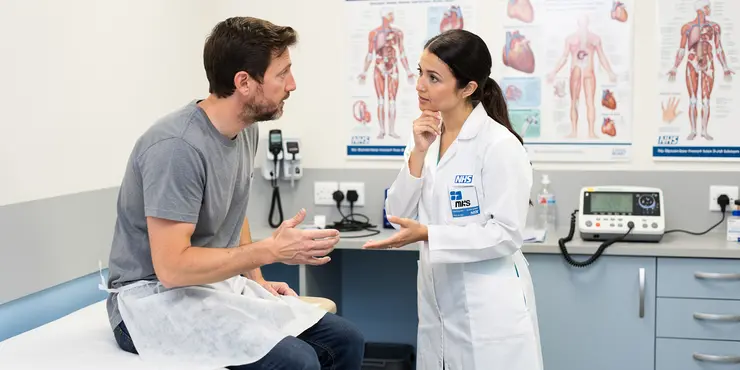
Find Help
More Items From Ergsy search
-

Heart Failure : What is heart failure?
Relevance: 100%
-

Heart Failure : Heart failure that cannot pump
Relevance: 97%
-

Heart Failure : Symptoms of heart failure
Relevance: 97%
-

Heart Failure : The normal heart
Relevance: 96%
-

What lifestyle changes can help manage heart failure?
Relevance: 95%
-

What is the role of diet in managing heart failure?
Relevance: 94%
-

Heart failure introduction
Relevance: 94%
-

Can heart failure be prevented?
Relevance: 90%
-

Can heart failure be cured?
Relevance: 90%
-

Heart Failure : When the heart becomes stiff?
Relevance: 89%
-

Are there different types of heart failure?
Relevance: 89%
-

What is the prognosis for someone with heart failure?
Relevance: 86%
-

What should I do if I experience symptoms of heart failure?
Relevance: 85%
-

Heart Failure : Treatment and monitoring of fluid retention
Relevance: 84%
-

What medications are commonly prescribed for heart failure?
Relevance: 81%
-

How does exercise impact heart failure?
Relevance: 80%
-

What causes heart failure?
Relevance: 79%
-

How is heart failure diagnosed?
Relevance: 78%
-

Is Baxdrostat used in treating heart failure?
Relevance: 78%
-

Can heart failure affect other organs?
Relevance: 73%
-

Can lifestyle changes reduce the need for medication for heart disease prevention?
Relevance: 71%
-

What is heart failure?
Relevance: 67%
-

Can lifestyle changes help manage ADHD?
Relevance: 63%
-

Can lifestyle changes help manage tinnitus?
Relevance: 63%
-

What is the role of lifestyle modification in heart attack and stroke prevention?
Relevance: 62%
-
What role do lifestyle changes play in managing psoriasis?
Relevance: 59%
-

Can lifestyle changes help manage BPH symptoms?
Relevance: 58%
-

What are the common symptoms of heart failure?
Relevance: 58%
-

Can lifestyle changes help manage Carpal Tunnel Syndrome?
Relevance: 58%
-

Can lifestyle changes help manage Huntington's disease?
Relevance: 57%
-

What lifestyle changes can help manage thrombosis risk?
Relevance: 55%
-

Can lifestyle changes help manage pain and fever during pregnancy?
Relevance: 55%
-

What are the long-term effects of a heart attack?
Relevance: 55%
-

Medicines of the heart
Relevance: 53%
-

Is my abnormal heart rhythm dangerous?
Relevance: 52%
-

Can chronic fatigue syndrome be managed with lifestyle changes?
Relevance: 52%
-

Are there lifestyle changes recommended with Baxdrostat?
Relevance: 51%
-

Is my abnormal heart rhythm dangerous?
Relevance: 51%
-

What lifestyle changes can help manage sleep apnea?
Relevance: 50%
-

Can lifestyle changes help with menopause masking?
Relevance: 50%
Understanding Heart Failure
Heart failure is a chronic condition where the heart is unable to pump blood effectively to meet the body’s needs. While it is a serious condition, certain lifestyle changes can help manage it more effectively, leading to improved quality of life. Here, we explore some practical lifestyle modifications that can support heart health.
Dietary Adjustments
Adopting a heart-healthy diet is crucial for managing heart failure. Reducing salt intake can prevent fluid retention and decrease blood pressure, easing the workload on the heart. The NHS recommends limiting salt to less than 6g per day. Incorporating more fruits, vegetables, whole grains, and lean proteins while reducing saturated fats can also be beneficial. Utilising the Mediterranean diet, which emphasizes healthy fats, can further support cardiovascular health. Staying hydrated is essential, but in some cases, fluid intake may need to be monitored based on medical advice.
Regular Physical Activity
Engaging in regular physical activity can strengthen the heart muscle, improve circulation, and reduce stress levels. It is important for individuals with heart failure to start with moderate activities, such as walking, cycling, or swimming, and gradually increase intensity based on medical guidance. Exercise routines should be tailored to individual capabilities, and it is advisable to consult with a healthcare professional before embarking on a new exercise programme.
Managing Stress and Mental Health
Stress can have a negative impact on heart health, so managing stress is an important aspect of living with heart failure. Techniques such as mindfulness, meditation, and deep-breathing exercises can help reduce tension levels. Regular engagement in hobbies and activities that bring joy and relaxation also plays a crucial role. In addition, addressing mental health concerns, such as anxiety and depression, with professional help when necessary, can contribute to overall well-being.
Avoiding Harmful Substances
Avoiding substances that can exacerbate heart failure is vital. Smoking cessation is one of the most significant lifestyle changes for improving heart health. Quitting smoking has immediate benefits, such as improved circulation and lung function, and reduces the risk of further heart complications. Limiting alcohol consumption is also recommended, as excess alcohol can worsen heart failure and lead to additional health issues.
Regular Medical Check-ups
Regular monitoring and visits to healthcare providers are essential for managing heart failure. Routine check-ups allow for timely adjustments in treatment plans and the management of medications. Patients should adhere to prescribed medications, monitor symptoms, and keep healthcare professionals informed of any changes. Vaccinations, such as the flu vaccine, are also recommended to prevent complications.
Conclusion
Implementing these lifestyle changes can make a significant difference in managing heart failure. By fostering a heart-healthy lifestyle, individuals can improve their quality of life and reduce the risk of complications. It is essential to work closely with healthcare professionals to tailor these strategies to individual needs, ensuring the most effective approach to managing heart failure.
Understanding Heart Failure
Heart failure is when the heart doesn’t pump blood well. This can cause health problems. But, changing some habits can help. You can feel better and live well by taking good care of your heart. Let's learn about some ways to help your heart stay strong.
Dietary Adjustments
Eating healthy foods helps your heart. Don't eat too much salt, as it can make your heart work harder. Try not to have more than 6 grams of salt each day. Eat more fruits, veggies, whole grains, and lean meats instead. The Mediterranean diet with good fats is great for the heart. Drink enough water but listen to the doctor about how much to drink.
Regular Physical Activity
Moving your body is good for your heart. Activities like walking, cycling, or swimming can make the heart stronger. Start slowly and do more as you feel better. Always talk to your doctor before starting any new exercise.
Managing Stress and Mental Health
Being too stressed isn't good for your heart. Try things like deep breathing, relaxation exercises, and hobbies you enjoy. If you feel anxious or sad, talking to someone can help. Looking after your mind is as important as looking after your body.
Avoiding Harmful Substances
Some things can harm your heart. Don’t smoke because it’s bad for your heart and lungs. Stopping smoking helps you feel better fast. Drink less alcohol as too much can hurt your heart, too.
Regular Medical Check-ups
Going to the doctor often is important. Regular check-ups help keep track of your heart health. Take your medicine and tell your doctor about any changes you feel. Get vaccines like the flu shot to stay healthy.
Conclusion
Making these changes can help manage heart failure. Taking care of your heart lets you live a better life. Always talk with doctors about the best ways to keep your heart strong and healthy.
Frequently Asked Questions
Useful Links
This website offers general information and is not a substitute for professional advice.
Always seek guidance from qualified professionals.
If you have any medical concerns or need urgent help, contact a healthcare professional or emergency services immediately.
Some of this content was generated with AI assistance. We’ve done our best to keep it accurate, helpful, and human-friendly.
- Ergsy carfully checks the information in the videos we provide here.
- Videos shown by Youtube after a video has completed, have NOT been reviewed by ERGSY.
- To view, click the arrow in centre of video.
- Most of the videos you find here will have subtitles and/or closed captions available.
- You may need to turn these on, and choose your preferred language.
- Go to the video you'd like to watch.
- If closed captions (CC) are available, settings will be visible on the bottom right of the video player.
- To turn on Captions, click settings .
- To turn off Captions, click settings again.
More Items From Ergsy search
-

Heart Failure : What is heart failure?
Relevance: 100%
-

Heart Failure : Heart failure that cannot pump
Relevance: 97%
-

Heart Failure : Symptoms of heart failure
Relevance: 97%
-

Heart Failure : The normal heart
Relevance: 96%
-

What lifestyle changes can help manage heart failure?
Relevance: 95%
-

What is the role of diet in managing heart failure?
Relevance: 94%
-

Heart failure introduction
Relevance: 94%
-

Can heart failure be prevented?
Relevance: 90%
-

Can heart failure be cured?
Relevance: 90%
-

Heart Failure : When the heart becomes stiff?
Relevance: 89%
-

Are there different types of heart failure?
Relevance: 89%
-

What is the prognosis for someone with heart failure?
Relevance: 86%
-

What should I do if I experience symptoms of heart failure?
Relevance: 85%
-

Heart Failure : Treatment and monitoring of fluid retention
Relevance: 84%
-

What medications are commonly prescribed for heart failure?
Relevance: 81%
-

How does exercise impact heart failure?
Relevance: 80%
-

What causes heart failure?
Relevance: 79%
-

How is heart failure diagnosed?
Relevance: 78%
-

Is Baxdrostat used in treating heart failure?
Relevance: 78%
-

Can heart failure affect other organs?
Relevance: 73%
-

Can lifestyle changes reduce the need for medication for heart disease prevention?
Relevance: 71%
-

What is heart failure?
Relevance: 67%
-

Can lifestyle changes help manage ADHD?
Relevance: 63%
-

Can lifestyle changes help manage tinnitus?
Relevance: 63%
-

What is the role of lifestyle modification in heart attack and stroke prevention?
Relevance: 62%
-
What role do lifestyle changes play in managing psoriasis?
Relevance: 59%
-

Can lifestyle changes help manage BPH symptoms?
Relevance: 58%
-

What are the common symptoms of heart failure?
Relevance: 58%
-

Can lifestyle changes help manage Carpal Tunnel Syndrome?
Relevance: 58%
-

Can lifestyle changes help manage Huntington's disease?
Relevance: 57%
-

What lifestyle changes can help manage thrombosis risk?
Relevance: 55%
-

Can lifestyle changes help manage pain and fever during pregnancy?
Relevance: 55%
-

What are the long-term effects of a heart attack?
Relevance: 55%
-

Medicines of the heart
Relevance: 53%
-

Is my abnormal heart rhythm dangerous?
Relevance: 52%
-

Can chronic fatigue syndrome be managed with lifestyle changes?
Relevance: 52%
-

Are there lifestyle changes recommended with Baxdrostat?
Relevance: 51%
-

Is my abnormal heart rhythm dangerous?
Relevance: 51%
-

What lifestyle changes can help manage sleep apnea?
Relevance: 50%
-

Can lifestyle changes help with menopause masking?
Relevance: 50%


